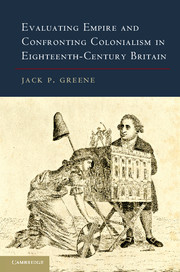Book contents
- Frontmatter
- Contents
- Preface Confronting Empire
- Prologue “Scene of a Foul Transaction”
- 1 “The Principal Cornucopia of Great-Britain's Wealth”
- 2 Outposts of “Loose Vagrant People”
- 3 “A Fabric at Once the Dread and Wonder of the World”
- 4 Arenas of “Asiatic Plunder”
- 5 Sites of Creolean Despotism
- 6 “A Fruitless, Bloody, Wasting War”
- 7 “This Voraginous Gulph of Hibernian Dependence”
- 8 A “Shadow of Our Former Glory”?
- Epilogue “Against Every Principle of Justice, Humanity, and Whatever is Allowed to be Right Among Mankind”
- Index
- References
4 - Arenas of “Asiatic Plunder”
The Languages of Humanity and Justice and the Excesses of Empire in India
Published online by Cambridge University Press: 05 June 2013
- Frontmatter
- Contents
- Preface Confronting Empire
- Prologue “Scene of a Foul Transaction”
- 1 “The Principal Cornucopia of Great-Britain's Wealth”
- 2 Outposts of “Loose Vagrant People”
- 3 “A Fabric at Once the Dread and Wonder of the World”
- 4 Arenas of “Asiatic Plunder”
- 5 Sites of Creolean Despotism
- 6 “A Fruitless, Bloody, Wasting War”
- 7 “This Voraginous Gulph of Hibernian Dependence”
- 8 A “Shadow of Our Former Glory”?
- Epilogue “Against Every Principle of Justice, Humanity, and Whatever is Allowed to be Right Among Mankind”
- Index
- References
Summary
The outcry against the Carib War, discussed in the Prologue, was not the first such massive public condemnation of developments in the broader overseas empire as an affront to metropolitan British standards of humanity and justice. Almost a decade earlier, reports of the misbehavior of East India Company employees in India had evoked an even more spirited, intense, and sustained public debate in which critics had used the languages of humanity and justice as the principal foundation for mobilizing a powerful critique of the operation of empire in the East. Inaugurating a wide-ranging political discussion about the conduct and legitimacy of empire that persisted for the next quarter-century, this critique, in turn, supplied the context for and helped to stimulate similar examinations of the behavior of Britons in other situations in the overseas empire – in American plantations, in the American war, and in Ireland, each of which will be pursued in a separate chapter of this volume.
To be sure, the language of humanity had always to some extent colored earlier discussions of empire – as a supplement to the languages of commerce and imperial grandeur, envisioning trade and empire as devices for extending the civility and humanity of Britain to the unbelieving and savage worlds of America, Africa, and Asia; as a late seventeenth-century condemnation of slave traders and slaveholders for their inhumane treatment of enslaved Africans and Amerindians and their failure to evangelize enslaved and indigenous peoples in the Americas; and even, after the middle of the eighteenth century, as a reproof to settlers for their unjust expropriation of Amerindian lands. But in the wake of the Seven Years’ War, the language of humanity, in association with the language of justice, acquired a new prominence as one of the principal languages employed by metropolitan Britons to speak about empire. For the first time on a wide scale, a series of problems, identified and intensely canvassed by analysts in the press and Parliament and first arising in reference to the situation in the new territorial acquisitions in India, forced metropolitan Britons to confront and endeavor to come to terms with the darker side of British colonialism.
- Type
- Chapter
- Information
- Publisher: Cambridge University PressPrint publication year: 2013



